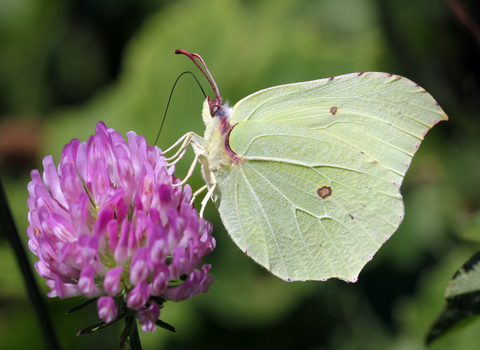
Brimstone ©Jim Higham
Brimstone
One of the joys of a spring day is watching a fluttering, lemon-yellow brimstone alight on a flower - an early sign that the seasons are changing. It is commonly spotted in gardens, woodland and parks.
Enw gwyddonol
Gonepteryx rhamniPryd i'w gweld
January to DecemberTop facts
Ynghylch
The brimstone is a fairly large, pale yellow butterfly, with distinctive, leaf-shaped wings. Adults hibernate through cold weather, so may be seen flying on warm days throughout the year, although they are most common in the spring. Usually seen in ones or twos, they are never very common, but are widespread. They can be found in damp woodlands, along sunny, woodland rides and mature hedgerows, and in large gardens. The foodplants of the larvae are buckthorn and alder buckthorn. Both shrubs are found in wet woodland, while buckthorn also occurs on dry chalk and limestone soils.What to look for
The brimstone is a large butterfly with a greyish body and characteristically veiny and pointed wings. Males are lemon-yellow, while females are greenish-white with orange spots in the middle of each wing. Brimstones rest with their wings closed.Where to find
Found across most of England, Wales and Ireland.Roeddech chi yn gwybod?
It is thought that the bright yellow colour of the male brimstone's wings inspired the name 'butter-fly'.Gwyliwch
Brimstone (https://vimeo.com/473835629/4ad1ca40f2)
Brimstone butterfly © Tom Hibbert
